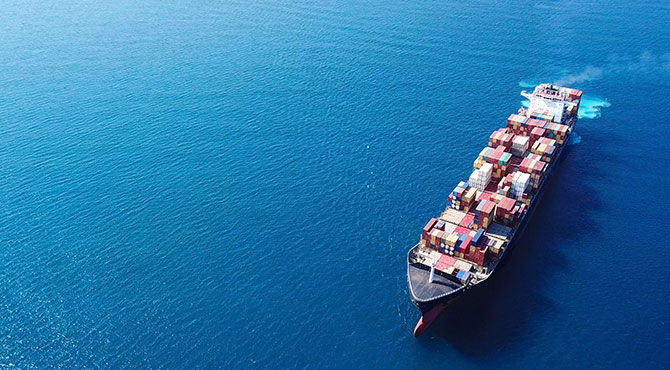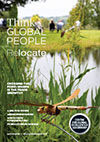Crossing the pond: Where is the growth?
With a number of free-trade deals under discussion, new horizons are opening up for global expansion and people mobility. David Sapsted explores the UK’s potential future trading partnerships.

 16 September 2021
16 September 2021What are the sticking points of a UK/Australia trade deal?
An FTA agreement with Australia was agreed in principle earlier this year after five years of tentative discussions following the Brexit referendum in June 2016. And, according to a report on the PoliticsHome website in August, Mr Johnson and his Australian counterpart, Scott Morrison, will finalise it when they meet at the COP26 climate change summit in November in Glasgow. Others, however, still believe it will not be a done deal until 2022.It is expected the agreement will remove tariffs on up to £4.3 billion worth of UK exports, including an immediate elimination on tariffs and whisky. In return, there will be an immediate lifting of duties in Australian exports to the UK, including wine.The controversial aspect of the deal is likely to be the lifting of all tariffs on Australian beef and sheep meat exports within ten years. Fears in the UK over animal welfare standards and the effects of cheap meat imports on the domestic agricultural industry are recurring themes in several other trade discussions. According to a forecast from the UK Trade Policy Observatory, UK sales will grow by just 0.35% from the agreement, compared to a 2.2% jump for Australia’s businesses.The Department for International Trade in London said "A Free-Trade Agreement with Australia is also a gateway into the fast-growing Indo-Pacific region and will boost our bid to join CPTPP (Comprehensive and Progressive Agreement for Trans-Pacific Partnership), one of the largest free trade areas in the world, covering £9 trillion of GDP and 11 Pacific nations from Australia to Mexico."When will a FTA negotiations between India and the UK begin?
Formal negotiations on an FTA between India and the UK are likely to start in the coming months following the unveiling in May of a 10-year roadmap that included an enhanced trade partnership (ETP) agreement to reduce market barriers and a commitment to double bilateral trade by 2030. The Institute of Export & International Trade in London said "A trade deal with India is likely to come as a shot in the arm for the Boris Johnson government as it tries to showcase gains from Brexit. For India, this is an opportunity to showcase itself as an alternative trading partner to China in a post-covid world. It also helps India demonstrate its commitment towards freer trade without much risk of incurring large trade deficits."The total trade between India and the UK is currently around $33 billion per year, including $15 billion worth of trade in goods and the rest in services. The UK is amongst India’s top ten exporting destinations while India is UK’s sixth-largest non-EU trading partner.Indian Commerce Minister Piyush Goyal, who is also in talks with Australia over an FTA, said recently, “The UK is something which is progressing well. We are working through line ministries to identify areas where we can quickly close the deal in the terms of early harvest, if possible.”In May, the UK launched a 14-week consultation on a future trade deal with India, seeking the views of the public and businesses.Wine, gin, lamb and chocolate: what are the details of a proposed UK/New Zealand trade deal?
All but a few lingering details of a trade deal with New Zealand were resolved after a month-long round of negotiations – the sixth between the two nations – at the end of July. It paved the way for what the Department of Trade and Industry (DTI) in London described as an agreement to "give British shoppers and exporters reason to cheer" with both countries ditching tariffs as high as 10% on a range of high-quality products.Those products ranged from chocolate and gin to buses and clothes as far as British exporters were concerned, and from wine and food to lamb and drinks on the New Zealand side."Under a new deal, a multitude of UK goods would no longer be subject to import tariffs when entering the New Zealand market, and exporters would gain an advantage over international rivals in the New Zealand import market, which is expected to grow by 30% 2030," said the DTI.Former UK Secretary of State for International Trade and current Foreign Secretary Liz Truss described the UK and New Zealand as "big fans of each other’s high-quality products", adding, “New Zealand and the UK are natural partners united by modern values. An agreement would reflect those ideals and is a win-win for both countries."Total trade in goods and services between the UK and New Zealand was worth £2.3 billion last year and is set to increase with a trade deal that pushes back barriers on green and digital trade.British farmers, however, have the same reservations over an FTA with New Zealand as they do with the potential deal with Australia. They argue that such FTAs could see UK domestic produce undercut by cheap imports, leading to a lowering of environmental and animal welfare standards.What are the chances of a UK trade deal with the USA?
An FTA with America is one deal that the UK will certainly not negotiate – let alone clinch – any time soon. Even the most optimistic accept it is at least two years away. Or, as Secretary of State Antony Blinken put it recently any agreement between the US and UK would take “some time”.Unlike his predecessor in the White House, Joe Biden is not prioritising bilateral trade negotiations and is focusing instead on domestic economic recovery in the wake of the pandemic.Even when trade talks do eventually begin, they will not be easy. American firms' access to Britain's nationalised health services will be a real bone of contention, as will agriculture. The US National Pork Producers' Council is keen to boost exports to the UK, but there is mounting opposition from Britain's farmers and animal welfare groups. American pork production costs are about half what they are in Britain because of the intensive rearing practices in the States, which would be unacceptable in the UK.But at least one obstacle was removed over the summer: the simmering, 17-year dispute over European subsidies to its airline makers, which led to former President Donald Trump imposing 25% tariffs on European Union exports worth £5.6 billion a year, including British exports of £550 million. In response, Europe imposed tariffs on £3 billion of US goods because of subsidies going to Boeing.In an olive branch to the new Biden administration, the UK suspended the tariffs last January and now, with the creation of a working group to resolve the plane-making row, Washington has abolished tariffs on imports of Scotch whisky, construction vehicles, cheese and cashmere for five years. Liz Truss described the agreement as drawing a line "under an incredibly damaging issue and means we can focus on taking our trading relationship with the US to the next level”.CPTPP and an Asia-Pacific trade deal
The UK has been desperately wooing the high-growth economies of Asia and the Indo-Pacific region since before Brexit became a reality. And with reason. As Foreign Secretary Dominic Raab told the Daily Telegraph in August, "The Indo-Pacific is the growth market of the future." Hence, the UK's application this year to become a member of the CPTPP trade bloc, whose current members are Australia, Brunei, Canada, Chile, Japan, Malaysia, Mexico, New Zealand, Peru, Singapore and Vietnam.Joining the bloc could be easier with the sealing of deals with Australia and New Zealand. And if, as suspected, the US decides to rejoin the bloc (Donald Trump pulled out of its predecessor early in his presidency) it could present the UK the opportunity to reach a back-door FTA with America.The UK also became a dialogue partner in August with the Association of Southeast Asian Nations (ASEAN), which will allow Britain to attend annual meetings of foreign and economic ministers, giving the country an opportunity to foster greater cooperation over trade, investment, climate change, the environment, science and technology, and education.Mr Raab also made it plain that he hoped there would be a political gain to “positively influence China” by being involved with ASEAN's ten member states Brunei, Cambodia, Indonesia, Laos, Malaysia, Myanmar, Philippines, Singapore, Thailand and Vietnam.According to the ASEAN Briefing website, the UK's pre-existing trade deals were likely to expedite accession to the CPTPP, although the size of its economy – second only to Japan among the bloc's existing members – could cause jitters among smaller nations.And, yet again, the UK could face resistance at home over lower cost and lower quality meat imports. "Canada and Japan, among other countries, faced similar hurdles in dealing with politically sensitive constituencies when negotiating the CPTPP. Ultimately, they came to an agreement to enter the deal by securing protections for their local dairy and rice farming industries, respectively," observed ASEAN Briefing, which suggested negotiations to join the CPTPP were unlikely to be resolved until 2022 at the earliest.Subscribe to Relocate Extra, our monthly newsletter, to get all the latest international assignments and global mobility news.Relocate’s new Global Mobility Toolkit provides free information, practical advice and support for HR, global mobility managers and global teams operating overseas.
 Access hundreds of global services and suppliers in our Online Directory
Access hundreds of global services and suppliers in our Online Directory
©2024 Re:locate magazine, published by Profile Locations, Spray Hill, Hastings Road, Lamberhurst, Kent TN3 8JB. All rights reserved. This publication (or any part thereof) may not be reproduced in any form without the prior written permission of Profile Locations. Profile Locations accepts no liability for the accuracy of the contents or any opinions expressed herein.





























